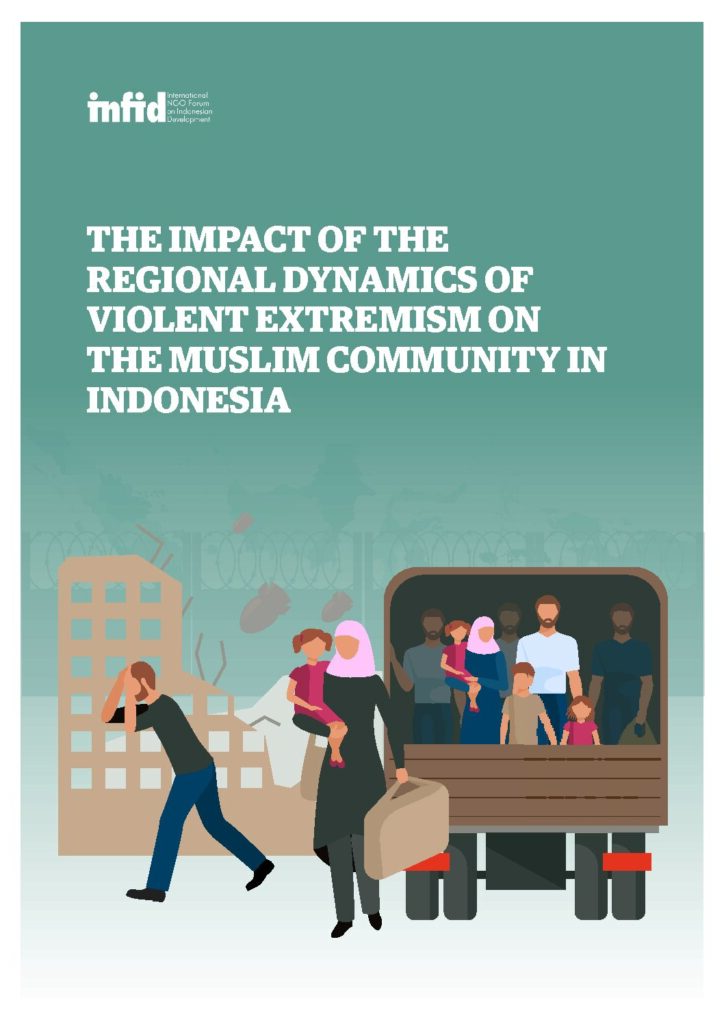The Impact of Regional Dinamic of Violent Extremism on Islamic Communities in Indonesia
• This research aimed to analyse the recent development of terrorist incidents and religiously motivated conflicts in the surrounding countries (Myanmar, the Philippines, etc.) which would have some spill over effects in Indonesia. This research was also expected to provide policy recommendation to relevant ministries and institutions, such as the Coordinating Ministry for Political, Legal, and Security Affairs, and Islamic Organizations. The research focus on the Rohingya case in Myanmar and Marawi case in the Philippines.
• Some finding from this research related to the Marawi cases:
• Islamist extremist groups primarily use propaganda narratives on oppression, injustice and threats to build solidarity within the Muslim community. These narratives are punctuated with references to religious texts embodying sacred values to provide justification for violence. Narratives countering radical extremist propaganda are therefore important. This has proven effective in presenting an alternative explanation for convicted terrorists serving time at the Lapas Sentul correctional facility regarding ongoing conflicts. The main narratives would hence no longer be monopolized by radical groups. Nevertheless, counternarratives are not enough as there are practices, either symbolic or actual, that violent extremist groups engage in. This means that disengagement from their groups is critical. This is proven by the fact the when in prison, they instead would have the opportunity to build much wider regional networks as they come from different countries.
• In addition to the narratives propagated on social media, other pull factors for those involved in the Marawi conflict are the drugs and arms trade and inter-group rivalry. However, the master narrative pertains to religion. For Indonesian Muslims, the Marawi conflict itself, in terms of narrative, at the moment is not as popular as the struggle in Palestine and Syria. Nevertheless, aggressive propagandizing by radical extremist groups such as IS has proven effective in influencing a small slice of the Muslim community in Indonesia, especially among ISIS supporters.
• Some finding from this research related to the Rohingya cases:
• the situation befalling the Rohingya has carried on for a considerable time, when the military government started instilling the spirit of religious nationalism. The ethnic Rohingya were historically brought in by the British colonial administration from Bangladesh, only to be pushed out of Myanmar and face discrimination. As a consequence, they are subjected to violence not only perpetrated by the military but also civilians indoctrinated with fascist religious nationalism. Pressures unrelentingly exerted on the Rohingya resulted in humanitarian, social and economic crises that have deprived them of a sense of safety, are stripped of their dignity as human beings, and went through afflictions arising from never-ending human rights abuses.
• The Rohingya crisis then became an international issue through the spread of narratives emphasising on the human rights violations against the Rohingya Muslims committed by Myanmar’s military government that also involves civilians. These narratives are disseminated through social media, spreading to Indonesia. Violent Islamic extremist groups responded to the narratives by calling for physical jihad against the oppressive Myanmar military.
• Some recommendations from this research are: To break the chain of “marginalization” and “call to jihad” narratives by minimizing multidimensional factors, social, economic and political problems, structurally and democratically through deliberative processes., and to counter narratives constructed by violent extremist groups through social media to neutralize their activism
• Building on this finding, the second phase of PROTECT project will strengthen the capacity of CSOs to promote human right-based narratives and strengthening the community resilience toward violent extremism at grassroot level.
Geographical Scope: Regional
Region: UNDP Asia and the Pacific
Country: Indonesia
Theme of Research: Counter Narratives Faith-based
Year Published: 2019
Responsible Entity: UNDP Indonesia/Bangkok Regional Hub



